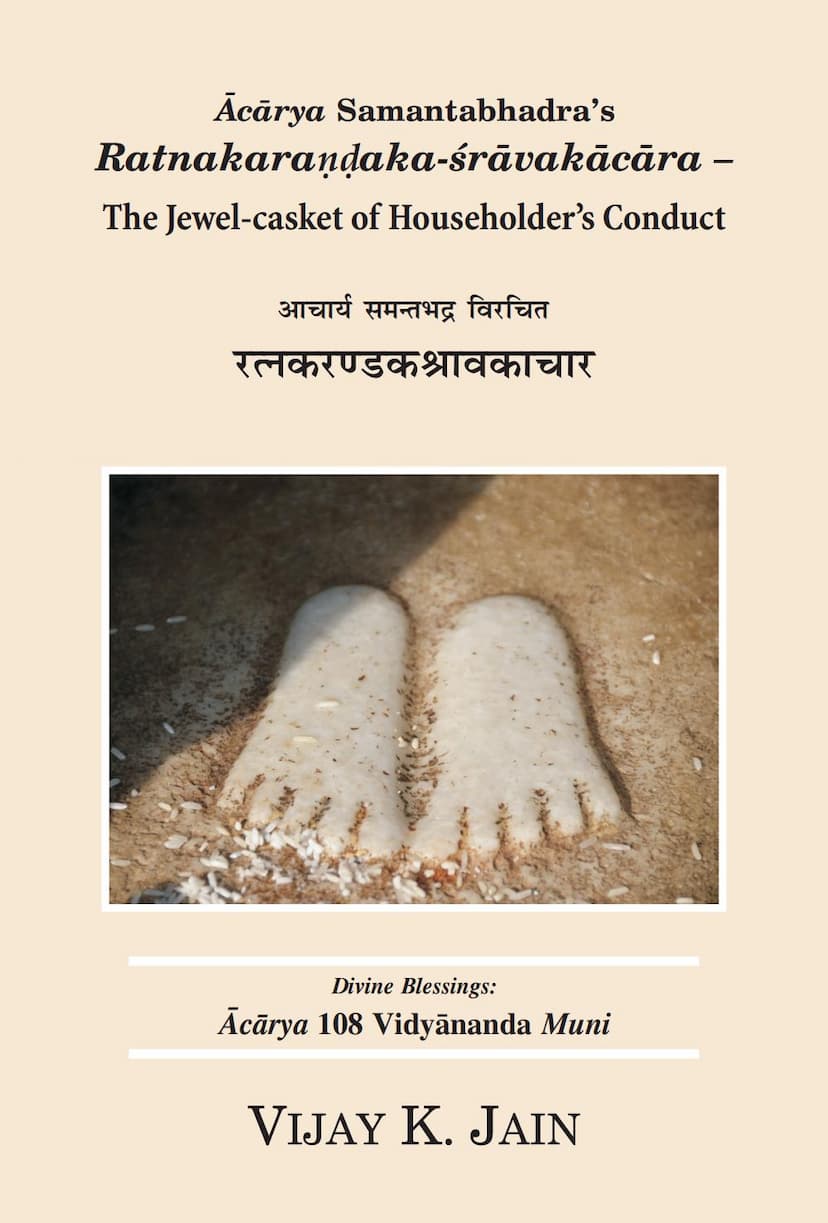Ratnakarandaka Shravakachar
Added to library: September 2, 2025

Summary
Here is a comprehensive summary of the Jain text "Ratnakarandaka Shravakachar" by Acharya Samantabhadra, based on the provided English text:
Ratnakarandaka Shravakachar: The Jewel-casket of Householder's Conduct
This text, authored by the esteemed Acharya Samantabhadra (flourishing around the 2nd-3rd century Vikram Samvat, CE), is a foundational Digambara Jain scripture dedicated to outlining the path of dharma for householders (śrāvakas). The title itself, "Ratnakarandaka," signifies a "jewel-casket," highlighting the precious and valuable guidance it offers. The English translation and publication by Vijay K. Jain is a significant contribution to making this text accessible.
Core Teachings and Structure:
The central theme of the book revolves around the Three Jewels (Ratnatraya) of Jainism:
-
Right Faith (Samyagdarśana): This is considered the bedrock of the path to liberation. It involves having unwavering belief in the Apta (the sect-founder or deity), the Āgama (the scripture), and the Guru (the preceptor). This faith must be free from three types of follies (mūḍhatā) – concerning worldly customs, deities, and preachers – and fortified by eight limbs (aṣṭāṅga), which include freedom from doubt, desire, revulsion, superstitions, and virtues like concealment of others' faults, steadfastness, propagation of the faith, and affection. It also emphasizes being free from eight kinds of pride (mada). The text highlights that right faith is the foundation upon which right knowledge and right conduct are built, and without it, the path to liberation is impossible, much like a tree cannot exist without a seed.
-
Right Knowledge (Samyagjñāna): This is the accurate and unwavering understanding of reality, free from doubt, perversity, and indefiniteness. It is achieved through the study of scriptures and contemplation. The text explains that right knowledge is acquired after right faith and helps in dispelling ignorance. It is categorized into five types: sensory knowledge (matijñāna), scriptural knowledge (śrutajñāna), clairvoyance (avadhijñāna), telepathy (manaḥparyayajñāna), and omniscience (kevalajñāna). The scripture is divided into four anuyogas or branches of knowledge:
- Prathamanuyoga: Deals with spiritual stories and lives of great figures (like the sixty-three śalākā puruṣa) to foster devotion and merit.
- Karananuyoga: Explains Jain cosmology, the nature of the universe, time cycles, and states of existence.
- Charaṇanuyoga: Focuses on the principles and practices of right conduct.
- Dravyanuyoga: Discusses the fundamental realities (tattvas) like soul (jiva) and non-soul (ajiva), merit (punya) and demerit (pāpa), bondage (bandha) and liberation (mokṣa).
-
Right Conduct (Samyakcāritra): This is the practical application of right faith and right knowledge through actions. For householders, right conduct is understood in two ways:
- Complete Conduct (Sakala Cāritra): Observed by ascetics who have renounced all possessions.
- Partial Conduct (Vikala Cāritra): Observed by householders who have limited possessions.
This partial conduct is further elaborated through:
- Small Vows (Aṇuvrata): Five vows that involve abstaining from gross forms of:
- Injury (Himsā): Avoiding harm to living beings.
- Falsehood (Anṛta): Speaking truth, not causing harm through words.
- Stealing (Steya): Not taking what is not given.
- Unchastity (Abrahma/Kuśīla): Contentment with one's own spouse.
- Attachment to Possessions (Parigraha): Limiting one's desires and possessions. Each of these vows has five specific transgressions (atyācāra) that should be avoided.
- Subsidiary Vows (Guṇavrata): Three vows that enhance the value of the small vows:
- Digvrata: Vow to restrict movement within certain geographical boundaries.
- Anarthadandavrata: Vow to abstain from purposeless sinful activities.
- Bhogopabhogaparimāṇavrata: Vow to limit the consumption of consumable and non-consumable objects. The text also details the transgression for each of these vows.
- Instructional Vows (Śikṣāvrata): Four vows that serve as training for ascetics:
- Deśāvakāśika: Further restriction of one's field of activity within a region.
- Sāmayika: Periodic concentration and renunciation of sins for a fixed time.
- Proṣadhopavāsa: Fasting on prescribed days (like the 8th and 14th of the lunar month).
- Vaiyāvrtya: Service to ascetics (giving food, medicine, shelter, and implements). Again, transgressions for each of these are explained. The text also mentions the importance of eight fundamental virtues (mūlaguṇa) for householders, which include the five small vows and abstaining from wine, meat, and honey.
Sallekhanā – Embracing Voluntary, Passionless Death:
A significant portion of the text is dedicated to Sallekhanā, the Jain practice of consciously and peacefully relinquishing the body when faced with incurable afflictions like severe old age, disease, famine, or unavoidable calamities. It is not suicide, as it is performed without attachment, aversion, or delusion, aiming for the purification of the soul. Sallekhanā is considered the ultimate culmination of penance and a means to achieve a favorable rebirth or liberation. The text emphasizes the importance of practicing detachment and contemplation of the soul during this process.
Eleven Stages (Pratimā) of the Householder's Conduct:
The text concludes by outlining the eleven stages (pratimā) that a householder progresses through on their spiritual journey. These stages represent increasing levels of detachment, adherence to vows, and spiritual purity, culminating in a state very close to that of an ascetic.
Key Principles Emphasized:
- Karma: The text consistently underscores the role of karma in shaping one's destiny and the importance of virtuous actions to improve future lives and move towards liberation.
- Anekāntavāda (Non-absolutism): While not explicitly detailed in the provided excerpts, the underlying philosophy of Jainism, which recognizes multiple perspectives, informs the comprehensive understanding of reality.
- Ahimsa (Non-violence): This is the paramount principle, permeating all aspects of conduct, from avoiding gross injury to subtle forms of causing harm.
- Detachment: A recurring theme is the need to detach from worldly possessions, relationships, and sensory pleasures to focus on the soul's purification.
In essence, Ratnakarandaka Shravakachar serves as a practical guide for householders, outlining a clear, step-by-step path towards spiritual progress and ultimate liberation by adhering to the principles of right faith, right knowledge, and right conduct, culminating in the virtuous acceptance of death through Sallekhanā.